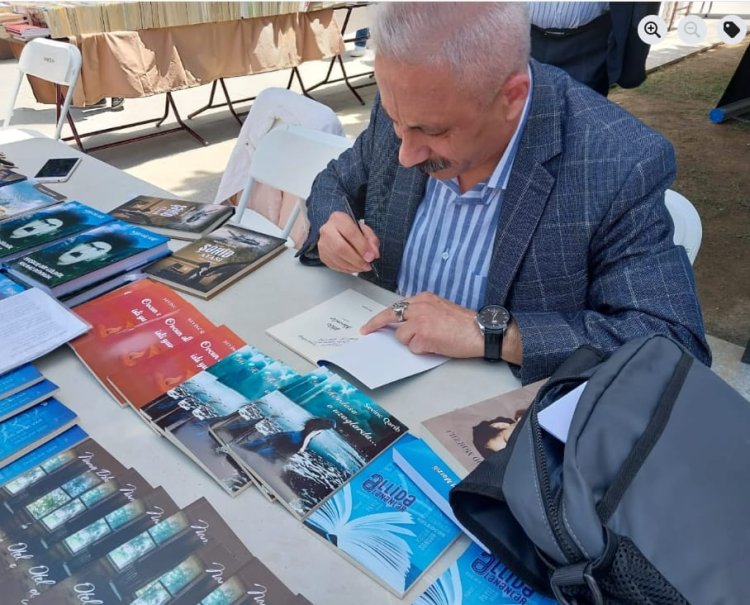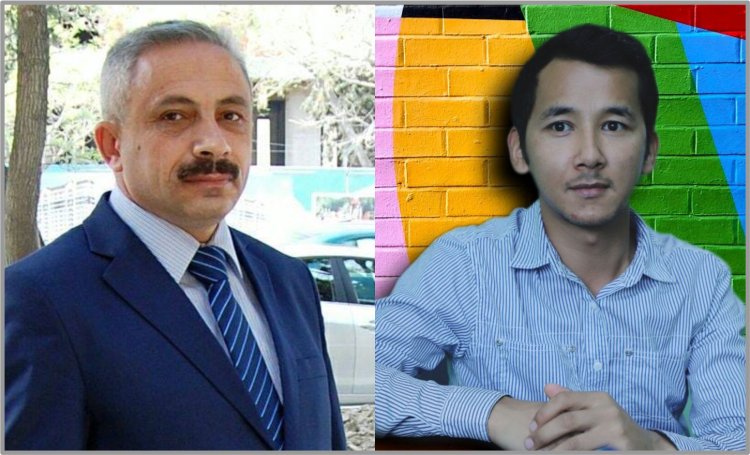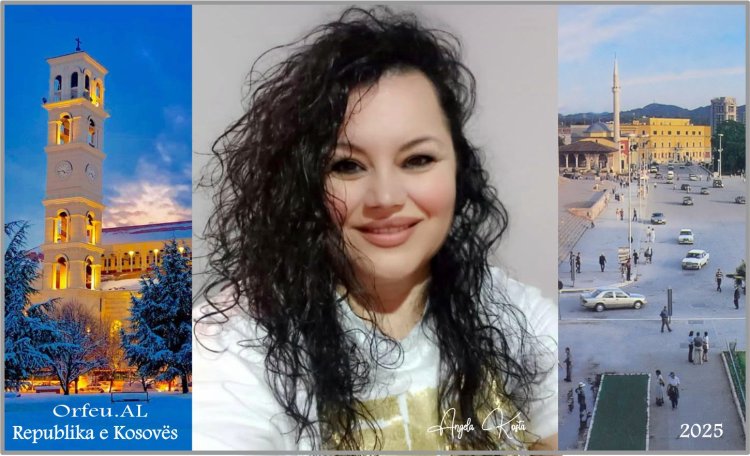THE BOOK – THE MOST BEAUTIFUL SOURCE THAT FEEDS THE SOUL
Our interviewee is the renowned Azerbaijani poet and journalist Namig Delidaghli, a member of the Azerbaijan Writers' Union and the Azerbaijan Journalists' Union, founder of the websites "Manevr.az" and "Dalidag.az", and a recipient of the Presidential Award.We believe that our interview with Namig Delidaghli, a well-known figure in modern Azerbaijani poetry, will attract great interest among readers.
- Mr. Namig, your activity is multifaceted. Along with being active in literary creativity, you are the founder of several literary websites and associations. You also write columns for two websites in Turkey, and more. Knowing that these works require effort and patience, we will not focus on that. Instead, how would you describe the relationship between journalism and literature, which are both dear to you?
- The main connection lies in the fact that both require talent, and those who possess writing skills try themselves in both fields and make their mark. The difference is that literature is purely creative, while journalism is also a socio-literary profession. However, the core material of both is the WORD.
-What do you think about the place of Azerbaijani literature on the international stage?
- Azerbaijani literature has a very ancient and rich history. According to official sources, the earliest examples of Ancient Azerbaijani literature are found in Herodotus's Histories, specifically the legends of "Media" and "Astyages." The most significant and enduring monument of ancient Azerbaijani literature is Avesta.The epic Kitabi Dede Gorgud is a magnificent artistic monument reflecting the heroic past of the Azerbaijani Turks. It remains relevant and widely read to this day. It should be noted that this epic is not only important for Azerbaijan but also holds international cultural value. In 2000, UNESCO included Dede Gorgud in the list of “Masterpieces of the Oral and Intangible Heritage of Humanity,” significantly contributing to its global recognition and preservation. Let me also emphasize that Azerbaijani literature has endured difficult yet honorable periods throughout history. For instance, during the repressions of the 1930s, Stalin and Baghirov’s regime labeled many patriotic writers and poets as “enemies of the people,” leading to their arrest, torture, and execution. In the post-Soviet era, authors who were not compliant or submissive to censorship often became victims of repression. Free speech and creativity faced serious obstacles, negatively impacting literary development. Despite all this, Azerbaijani literature has made valuable contributions to world literature. It is especially after the country’s independence that Azerbaijani literature entered a new era of growth and has since produced high-quality poetic and prose works recognized internationally.

- What steps are being taken to develop literary relations with Uzbekistan, Kazakhstan, and other Central Asian countries? How would you describe your personal connections in this regard?
- In general, our country has broad relations with Turkic-speaking states in all fields, and we are very interested in expanding these. This also applies to literature. Through media channels and personal relationships, we strive to present our literary work on a broader platform and foster mutual connections. There are various organizations and literary unions that are very active in this area.
Last year, my latest poetry collection was published in brotherly Uzbekistan. I am grateful to the friends there who supported me. I also hope that my books will be published in other Turkic-speaking countries, and work is ongoing in this direction. My literary pieces are regularly published in the press and media of Central Asian countries. Likewise, on the websites I manage, we frequently publish works by creative individuals from those countries.
- Mr. Namig, what are the main themes of contemporary Azerbaijani literature?
- It would be more accurate to answer this from a personal perspective because creativity is an individual matter. It wouldn’t be right to speak for others. Everyone has their own voice, message, and spirit.
As an Azerbaijani citizen, I am currently most focused on the spirit of victory. Of course, we will continue to reflect the brutality, pain, and suffering caused by the enemy over time in our works—this must never be forgotten! But as someone from a country that endured nearly thirty years of Armenian aggression, I now choose to write not about sorrow and grief, but about our bright victory, our triumph, and the courage of the brave Azerbaijani soldier.
- In your opinion, is the interest in literature and reading books the same as it used to be today? How can we encourage and cultivate a love for reading among young people?
- Naturally, compared to earlier times, the interest in reading books has noticeably declined. There are objective reasons for this. In today's era of information overload and ever-expanding areas of interest, the enthusiasm for reading has diminished. Just as we tend to seek the easiest way in everything, we also try to fulfill our spiritual needs through simpler means. That's why internet resources that substitute books partially fill this void. This is a natural development. The world is evolving rapidly.
However, nothing can replace the nourishment and peace that a book gives to the soul. So, I would recommend to the youth: don’t alienate yourselves from books. A book is, indeed, one of the most beautiful sources that feeds the soul.
- Have there been any coincidences in your life that influenced your creative path?
- There haven’t been any remarkable coincidences that played a significant role in my life or my creative journey. Whatever I have achieved in life has been through hard work and my own strength.
- If you had the opportunity to change any part of your life, what would you change and why?
- Nothing. Because such a thing is not possible.
- In your view, how do creative individuals perceive the world, and how do they express it?
- Everyone knows that this world is temporary—whether they are creative or not. The main difference lies in understanding. (In fact, the world itself is eternal. We come and go, but it remains.)
Despite knowing this world is not eternal, some people still choose to do more harm than good.
Also, creative individuals tend to build a world within the world-a realm of dreams, perhaps a personal paradise they consider eternal. It’s a form of consolation too...
- What is the relationship between a creative person’s sense of responsibility and their personal responsibilities?
- Responsibility is one of the most positive traits of a human being. Precision lies at the heart of both personal and creative responsibility. A person who is responsible in their personal life usually carries that same quality into their creative work.
However, I’ve observed something else too: sometimes, the laziness that resides in creative souls overshadows their sense of responsibility. This, in many cases, is beyond one’s control.
- Do you think a writer or poet’s worldview differs from others? What principles should they adhere to?
- A writer’s or poet’s worldview may be similar to that of others. But their perspective on life and the world is often different.
Creative individuals, due to their influence and standing in society, are expected to be more careful and responsible. Because their words have the power to shape public consciousness and influence people’s ways of thinking.
Interview by : Jakhongir NOMOZOV,
is a young poet and journalist from Uzbekistan. He is also a
Member of the Union of Journalists of Azerbaijan
and the World Young Turkic Writers Union.
Prepared Angela Kosta





